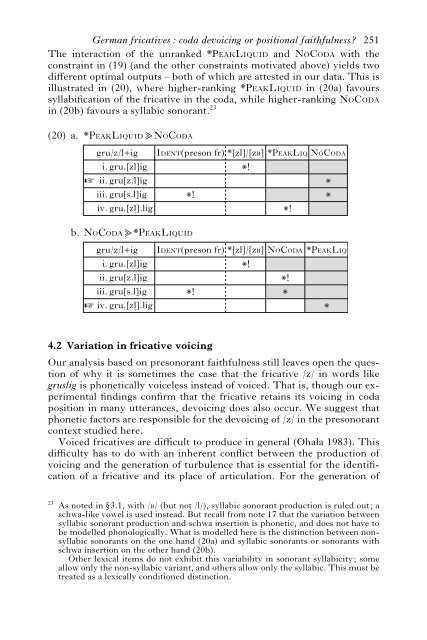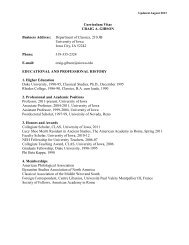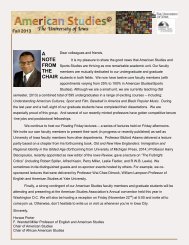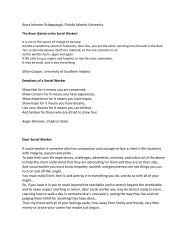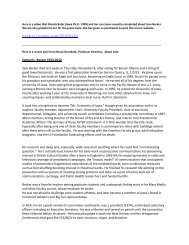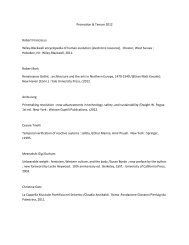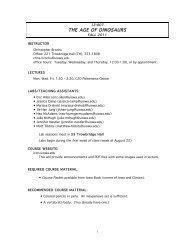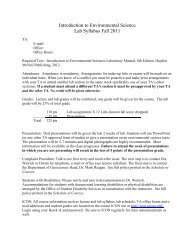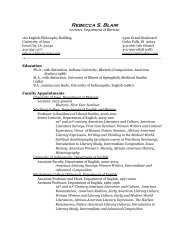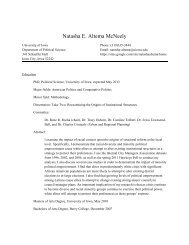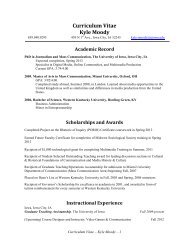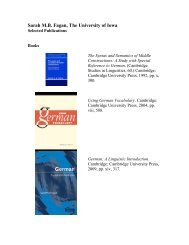German fricatives: coda devoicing or positional faithfulness?
German fricatives: coda devoicing or positional faithfulness?
German fricatives: coda devoicing or positional faithfulness?
Create successful ePaper yourself
Turn your PDF publications into a flip-book with our unique Google optimized e-Paper software.
<strong>German</strong> <strong>fricatives</strong>: <strong>coda</strong> <strong>devoicing</strong> <strong>or</strong> <strong>positional</strong> <strong>faithfulness</strong>? 251<br />
The interaction of the unranked *PEAKLIQUID and NOCODA with the<br />
constraint in (19) (and the other constraints motivated above) yields two<br />
different optimal outputs – both of which are attested in our data. This is<br />
illustrated in (20), where higher-ranking *PEAKLIQUID in (20a) favours<br />
syllabification of the fricative in the <strong>coda</strong>, while higher-ranking NOCODA<br />
in (20b) favours a syllabic son<strong>or</strong>ant.23<br />
(20)<br />
a.<br />
*PeakLiquidêNoCoda<br />
gru/z/l+ig Ident(preson fr) *[zl]/[z] *PeakLiq NoCoda<br />
i. gru.[zl]ig<br />
*!<br />
ii. gru[z.l]ig<br />
*<br />
iii. gru[s.l]ig *!<br />
*<br />
iv. gru.[z'].lig<br />
*!<br />
b. NoCodaê*PeakLiquid<br />
gru/z/l+ig<br />
i. gru.[zl]ig<br />
ii. gru[z.l]ig<br />
iii. gru[s.l]ig<br />
iv. gru.[z'].lig<br />
Ident(preson fr) *[zl]/[z] NoCoda *PeakLiq<br />
*!<br />
*!<br />
*!<br />
*<br />
*<br />
4.2 Variation in fricative voicing<br />
Our analysis based on preson<strong>or</strong>ant <strong>faithfulness</strong> still leaves open the question<br />
of why it is sometimes the case that the fricative /z/ in w<strong>or</strong>ds like<br />
gruslig is phonetically voiceless instead of voiced. That is, though our experimental<br />
findings confirm that the fricative retains its voicing in <strong>coda</strong><br />
position in many utterances, <strong>devoicing</strong> does also occur. We suggest that<br />
phonetic fact<strong>or</strong>s are responsible f<strong>or</strong> the <strong>devoicing</strong> of /z/ in the preson<strong>or</strong>ant<br />
context studied here.<br />
Voiced <strong>fricatives</strong> are difficult to produce in general (Ohala 1983). This<br />
difficulty has to do with an inherent conflict between the production of<br />
voicing and the generation of turbulence that is essential f<strong>or</strong> the identification<br />
of a fricative and its place of articulation. F<strong>or</strong> the generation of<br />
23 As noted in w3.1, with /H/ (but not /l/), syllabic son<strong>or</strong>ant production is ruled out; a<br />
schwa-like vowel is used instead. But recall from note 17 that the variation between<br />
syllabic son<strong>or</strong>ant production and schwa insertion is phonetic, and does not have to<br />
be modelled phonologically. What is modelled here is the distinction between nonsyllabic<br />
son<strong>or</strong>ants on the one hand (20a) and syllabic son<strong>or</strong>ants <strong>or</strong> son<strong>or</strong>ants with<br />
schwa insertion on the other hand (20b).<br />
Other lexical items do not exhibit this variability in son<strong>or</strong>ant syllabicity; some<br />
allow only the non-syllabic variant, and others allow only the syllabic. This must be<br />
treated as a lexically conditioned distinction.


